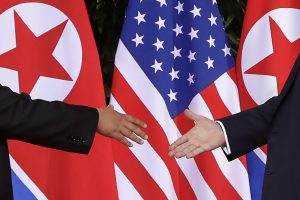Former North Korean diplomat Ryu Hyun-woo gave his first interview on January 31 since defecting to South Korea more than a year ago, and he spoke what should be obvious: North Korea will not denuclearize – at least, not any time soon. “North Korea’s nuclear power is directly linked to the stability of the regime,” Ryu told CNN. “I can’t imagine they abolish this.”
This is a message U.S. President Joe Biden needs to hear. After some promising sallies into diplomacy, the Trump administration squandered its chance with North Korea by demanding Pyongyang commit to full denuclearization before serious talks could even begin. Biden can’t improve on that dismal record if he begins with the same mistake. He must accept that denuclearization is not a realistic goal for U.S.-North Korea relations for the foreseeable future and negotiate instead for more achievable ends.
Ryu’s comments are not exactly a new insight. On the contrary, the Kim regime’s one transparency is its commitment to its nuclear arsenal and its reasoning behind that stance. Kim Jong Un believes – rationally enough – that if he gives up his nuclear arms, he opens himself to U.S.-forced regime change and perhaps his own death. He believes this because he’s seen it happen, and he won’t change his mind until he no longer perceives that risk.
North Korean state-run media has explicitly pointed to Iraq’s Saddam Hussein and Libya’s Moammar Gadhafi as exemplars of the fate Kim seeks to avoid. Both were dictators on the U.S. hit list, and without nuclear arms, both were deposed and killed. For all his bluster, Kim without nukes is nothing but the cruel dictator of a poor country with weak, antiquated conventional forces and soldiers literally stunted by oppression. His nuclear weapons are his one reliable insurance of regime (and personal) survival. Insider knowledge of Pyongyang isn’t necessary to see Ryu is right.
If Biden retains Washington’s longstanding policy – and his own campaign plan – of demanding denuclearization or nothing, he’ll get nothing. This is Ryu’s pessimistic prediction: “The U.S. can’t back down from denuclearization,” he said, “and Kim Jong Un cannot denuclearize.” In this scenario, the stalemate is permanent. U.S.-North Korea relations will be as stagnant at the end of Biden’s term as they are at its beginning.
That’s not the worst outcome for U.S. security. We can live with stalemate if we must – in fact, we’ve been living with it for decades. U.S. deterrence will continue to hold, as Kim realizes unprovoked aggression on his part would result in exactly the invasion and overthrow he hopes to escape.
But surely we can do better than stalemate. The Biden team should look past denuclearization to diplomatic outcomes that are actually feasible in the short term. A nuclear freeze is a strong option in the national security arena, as is an official peace treaty for the Korean War.
We should also lift U.S. sanctions that make the average North Korean’s life more difficult, open up North Korea to international culture and trade, divert diplomatic leadership to South Korea, and foster positive inter-Korean relations to make conflict less likely and allow families separated for decades to reunite. A good place to begin is with South Korea’s recommendation this week of lightening the sanctions load – which is not accomplishing any movement toward denuclearization anyway – as a gesture of goodwill to entice Pyongyang back to negotiations.
Whether Biden will reject the demonstrably failed status quo of demanding denuclearization remains to be seen. His campaign-trail stance redoubled the discredited approach of administrations past, and in an interview with MSNBC this week, his secretary of state, Antony Blinken, reiterated “the denuclearization of the Korean Peninsula” as Biden’s goal.
But Blinken also acknowledged U.S.-North Korea relations have “gotten worse across administrations” and said Biden has asked for a review “to make sure that we’re using the most effective tools” in this diplomacy. Perhaps that review will reveal the self-evident fact: that even the best tools can’t accomplish an impossible task.
Bonnie Kristian is a fellow at Defense Priorities, contributing editor at The Week, and columnist at Christianity Today. Her writing has also appeared at CNN, NBC, USA Today, the Los Angeles Times, and Defense One, among other outlets.
































